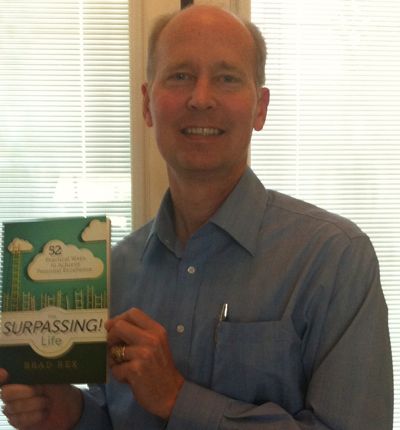In today’s post, our frequent guest columnist Brad Rex, weighs in on the importance of being true to one’s self. “To Thine Own Self Be True” is an excerpt from his book, “The Surpassing! Life.”
Brad asks:
How well do you know yourself?
Have you figured out what makes you tick?
As a father of twins, I quickly discovered that people are wired differently from the day of conception. Environment may have some influence, but you were born with your unique desires and capabilities.
The better you understand yourself, the more easily you can leverage your strengths and satisfy your inner longings. Thanks, as always, for your sage advice and insights, Brad!
To Thine Own Self Be True
The first principle is that you must not fool yourself—and you are the easiest person to fool.–Richard Feynman
One must know oneself, if it does not serve to discover truth, it at least serves as a rule of life, and there is nothing better.–Blaise Pascal
Delusions of grandeur make me feel a lot better about myself.–Jane Wagner
One of the most important types of knowledge you need to acquire is self-knowledge.
Many people get book knowledge or street smarts, but never get to know their own strengths, passions, blind spots, and weaknesses. This ignorance results in inferior performance and even complete personal failure.
Sadly, when failure occurs, the person often looks back and sees the times when they could have gained self-knowledge, and deeply regrets the missed opportunities.
I’m an assessment junkie. Over my 30 years in the military and corporate world, I’ve taken about every test possible. Myers-Briggs, DISC, Gallup Profile, Gallup StrengthsFinder, 360 degree feedback, corporate assessments, health assessments—you name it, and I have probably taken it.
This is not because of any love for standardized tests. Rather, it reflects my desire to know as much as possible about myself and my leadership. I have discovered whom I work well with, and whom I need to partner with to make up for my weaknesses.
I’ve found out things that I like to do and excel in, and other things that I need to minimize or delegate. The assessments have helped me to become a better person and leader.
Whenever I do an assessment, I have my wife read the results and tell me whether she thinks it is accurate. Having lived with me for over 30 years, I figure she should have the best picture of who I am and how I behave.
Invariably, she will agree with the assessment.
It amazes me how a test can determine my inner psyche from answering a series of multiple choice questions! As much as I may want to challenge the results, it’s hard to refute multiple assessments (and my wife) that all concur on the conclusions.
I think one of the most useful assessments is Gallup StrengthsFinder. This test showed my strengths as Responsibility, Maximizer, Achiever, Learning, and Belief.
The analyst who discussed the results with me said my profile matched a classic workaholic.
“Companies must love you, because your Maximizer means you always want to improve things, your Achiever pushes you to do more and take on new challenges, and your Responsibility means you will get the job done.”
I felt pretty good about her comments, until she concluded, “Of course, people like you die at an early age from a heart attack.”
Fortunately, that part of her assessment has not come true, but she did cause me to evaluate my work habits, and make worthwhile changes.
We often tend to view others through the lens of our own personality, and gravitate toward those who are like us.
Being self-aware can ensure that you don’t fall into this blind spot, and that you have diverse friends and employees. It also prevents you from being overly critical of people who aren’t like you.
For example, people who didn’t have the strength of Responsibility used to drive me crazy. I viewed them as lazy or disorganized.
After doing the assessments, I recognized that many people do not score as highly in this area as I do, and I need to be much more forgiving.
If you are a leader, you should have your team go through an assessment process, and review the composite results. You will likely find that your team lacks strengths in particular areas, and you should consider this with your next hire.
With the easy availability of inexpensive, online assessments, you don’t have any excuse when it comes to knowing yourself. Seek self-knowledge, and you will find a surpassing life.
Action Points
• Take advantage of every opportunity to go through an assessment process and learn more about your strengths, weaknesses, interests, and abilities.
• Check the results with someone who knows you well, like parents, close friends, or your spouse. Ask them to make you aware of when you are displaying strengths, weaknesses, or blind spots.
• Use the results of your assessment to change the way you look at others, so you are more understanding.
• Have your team do individual assessments, and then review the composite to determine your team’s strengths and weaknesses.
Payoff
Higher individual and team performance, improved interpersonal relationships, and not dying young from a heart attack!















































